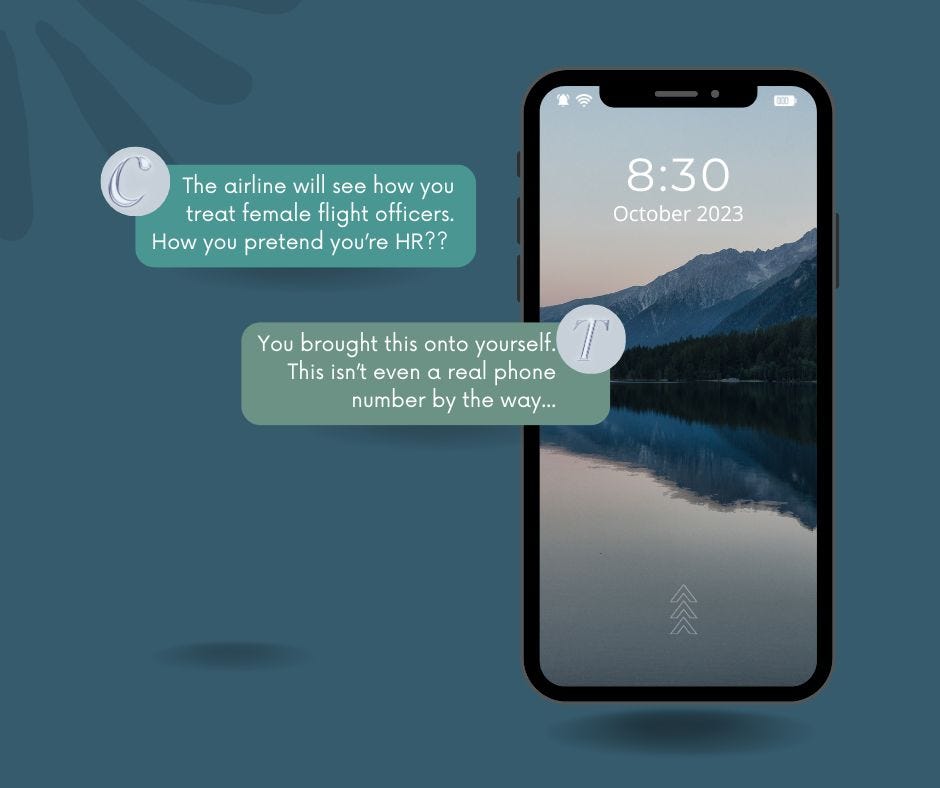EXCLUSIVE: Pilot Fired After Reporting 'Cheating,' Harassment at Regional Airline
Did Republic Airways retaliate against whistleblower Cassaundra van den Heuvel? (The airline hasn't commented)
“If you knew what really goes on, you’d never get on a regional plane again,” says former Republic Airways employee Cassaundra van den Heuvel, an experienced pilot with a spotless 28-year record.
Spotless, that is, until this autumn when she blew the whistle at Republic, an Indianapolis-based regional airline contracted to operate for United, Delta and American.
Van den Heuvel says that in October, she told bosses of her fears there might be systemic “cheating” on written tests, and also reported being sexually harassed by a fellow employee she describes as a “superior.”
On October 17, van den Heuvel shared her concerns with the Federal Aviation Administration (FAA) by phone. Later that same day, she informed Republic bosses she’d made the call.
On October 18, she was fired.
“I’m obliged to report this,” says van den Heuvel, who in her lifetime has suffered the unimaginable loss of both a fiance and a husband to fatal airplane crashes. “I know what the consequences are. To do nothing makes me complicit and just as bad as the people who are [allegedly] doing it.”
Against the grim backdrop of an industry where regionals are struggling to survive, captains are in short supply, and there’s a perceived pilot shortage in the U.S., van den Heuvel says she’s concerned the airline might, allegedly, be trying to make it easier for young pilots to get through training without knowing all they should—and that’s a recipe for disaster.
“This is way bigger than [my situation with the airline],” she tells me of her decision to share her story publicly. “Maybe we can save lives here.”
She provided me with texts, letters, screenshots of call logs, and other documentation. I have read the termination letter sent to her by the airline. It lists several alleged transgressions the company fired her for, including posting on social media and violating three of the airline’s standards of conduct.
I contacted Republic Airways about all of this last week, but as of presstime, they have declined to comment. I also gave the FAA a buzz. Keep reading.
Tested
She’s served in roles ranging from captain to senior flight instructor in multiple countries, but in 2023 van den Heuvel found herself in a training group with a dozen young men after refusing Republic’s offer to join its ranks as a direct-entry captain.
“I said, ‘I’m not going to fly as captain until I learn the jet,’” she tells me. “I’m not taking that responsibility until I’m ready. It’s an 85,000-pound jet. I never flew a jet that size, and I hadn’t flown in three years. I don’t want to make the six o’clock news being the asshole who killed everybody, sorry.
“They put me in a class with twelve first-officer candidates. They’re young and wet behind the ears. I’m only there to operate as an F.O. for a few months. It was a formality that I myself requested based on integrity.”

Van den Heuvel’s suspicions kicked in while sitting for the final exam. It’s a difficult test, and after days of studying, she was planning to be in the room for “a couple of hours.”
“This [test] is from the FAA. This is part of the airline operating certificate,” she says. “You can’t operate without it. This training is hard. It’s made that way. Otherwise go get a job at the gas station, right?”
Yet, “after a half hour, [the rest of the class] gets up and leaves,” she recalls. “I’m in there alone. I look at the instructor. I was in there another forty-five minutes, and I was the best one in the class.”
In the hours and days after the test, she probed multiple colleagues seeking clarity. She says she discovered one particular pathway to success. “Republic has created a culture where they’ve got it all set up where everyone works in a study group,” she says.
While I won’t detail all her allegations here (again, Republic has not commented, nor are classmates able to respond, and I make no suggestion those candidates did anything improper in their training), van den Heuvel explains what worries her is some of the written tests contain comprehensive questions, and to do well, it generally requires you to to take time to solve the problem.
“It’s a scenario-based thing. Even in tests where you can look at your notes, the questions are subjective,” she explains. “For example, you’re flying into JFK, here’s the weather, here’s the situation on the plane, here’s the weight and balance, these runway lights are working, these others are out, what are your minimums? Even if you look it up, unless you understand what RVR is, if you don’t have these lights, if these lights aren’t working…you have to think.”
Meantime, she didn’t make any official reports about what she was learning. “I was like, ‘I won’t tell anybody.’ At this point I’m just trying to survive.”
Van den Heuvel says that in mid-October, she messaged her fellow classmates via a group chat—which also included instructors—to say she was unhappy to be the only trainee left out of a separate study-related chat.
“I said ‘Hey guys, you’re not including me in the group study chat. I get that I’m the only woman, but that’s not very cool.’ The ringleader pops on and said ‘My bad, I’m creating a new group chat and you’re going to be part of it.’ And I was. But why wasn’t I on the last one?”
After that, she says, the conversation with the younger male pilots went off the rails.
In a long, tense exchange with a texter calling himself “a concerned anonymous classmate,” she alleges the men bullied her, excluded her and engaged in cheating on written tests; the anonymous texter denies it all, saying in part that “nobody is bullying you, my friend.”
At one point during their sparring, she makes it clear she’s preserving information to report to human resources.
Take it up with HR, she writes.
Sandy. This is HR, anonymous replies, using the name she often goes by.
That gave her a chill, she says, because she had no way of knowing for sure who she was corresponding with.
But the discourse reached ugly new heights when he taunted her about her husband’s agonizing death.
The texter copied and pasted a passage from this story about the lawsuits filed after a 2012 crash in Arizona that killed three people, including Cassaundra’s husband Rob van den Heuvel, a retired KLM pilot and former Dutch Air Force fighter pilot who was helping train KLM cadets in Arizona. He was in the back seat.
The first two texts read,
Meanwhile “van den Heuvel had a well-known reputation of being cavalier regarding flight safety and [for] engaging in unsafe flight practices,” the complaint states.
“Van den Heuvel engaged in intimidating tactics and behavior with the CAE flight instructors and had great influence over which students would progress though the CAE/KLM training program and eventually become JAA certified airline pilots.”
The third and final text drips with sarcasm:
I’m so sorry for your loss, can’t even imagine what you’ve new [sic] through. Bless your heart.
Cassaundra van den Heuvel wasn’t going to let that go.
“There was soot in his lungs. He was still alive after the crash,” she says of her husband’s death. “And [this anonymous texter] dredges it up from Google. My husband was a pilot for the royal family. He is an icon in Dutch aviation. The king attended his funeral. You don’t get to do this to me.”
She lost her husband in the crash, and then her assets in the lawsuit. “I’ve taken the hits, and once you’ve taken the hits, at some point in time you get up and wipe the blood off your mouth and say, ‘You hit like a b—. Bring it.
“It’s the only way you can survive this thing. The pain is excruciating.”
From Bad to Worse
On top of all of this, van den Heuvel was dealing with a senior person at work engaging in ongoing text conversations with her that she says made her feel uncomfortable and harassed. She says she tried “nice ways” of steering the conversation away from sexually charged texts, but “He didn’t take it that way, because they never do.”
She says that on October 16, she made a report to HR about all of it, and then everything began to roll downhill, unstoppable as a rockslide. First, she says, managers pulled her access.
“They locked me out of my work account,” she says, which she believes they did because “they thought the information was in the company chat and emails. They locked me out of the company email and chatting in-house, thinking all those messages were in there. They’re all on my personal phone.”
On Tuesday morning, October 17, she made a call to the FAA to report her concerns. The person who answered gave her a different number to call.
At 9:40 a.m. MST, van den Heuvel called the number, which took her to the FAA’s Southwest Enforcement Team in Oklahoma. Call logs show she stayed on the phone for four minutes and nine seconds, which she says was a voicemail.
I contacted the FAA last week and provided them all the details of where and when exactly van den Heuvel had left her message. A few days later, I was told the administration was working to get in touch with her, and we’ve now connected van den Heuvel to the best person to follow up on her report.
On Thursday, an FAA spokesman sent me a statement:
“We encourage anyone with aviation safety concerns to contact the FAA hotline. We take these concerns very seriously and investigate every hotline submission where the complainant provides sufficient information.”
Back to October 17. In the next hour or two, van den Heuvel’s logs show several calls to Republic’s Indianapolis HQ, at which point she says she was letting her managers know about her report to the FAA.
Meanwhile, when it came to the information she’d given HR the previous day, it was crickets that morning. Finally, later that day, she says she received a missive from a manager along the lines of, Don’t message anybody else. Just wait and stop messaging people. HR will be in touch.
“I thought, Oh, you’re going to try to silence me. My radar is going off. I can see what’s going to happen to me. I see where they’re going.”
The Firing: Retaliation or…Not?
Van den Heuvel says she was triggered by those events, a feeling that led to a perhaps ill-advised LinkedIn post. In it, she says she warned women against joining Republic and alleged they promote discrimination, for example. She took the post down within hours.
On October 18, she was called into a meeting with management including employee relations.
That same day, Republic sent her a certified letter noting that van den Heuvel “hung up” before they could finish discussing the findings and informing her of her termination for violating company policy about social media along with three others, including one that prohibits Use of unprofessional, vulgar, abusive or loud language, actions, or materials to any associate, supervisor, manager, or guest.
I found one alleged violation—the one for Unprofessional or immoral behavior or indecent conduct—confounding.
“Unprofessional” can range from eating your colleague’s ham sandwich out of the break-room fridge to yelling at your boss. Immoral or indecent behavior can be flashing your coworker or pulling a Michael Haak in the workplace. I asked van den Heuvel what she thought led to this quite broad allegation.
No doubt she gives as good as she gets, and she did fire off a few choice lines over those days, she says. When a person in management spoke about spending time with their family, van den Heuvel replied, “I hope that you’re a better role model for your children than you are at your company.”
There was another one she recalls, but it was after her firing, she says.
“I did make a nasty comment to one of them. I was not in a great state of mind,” she says. “I got really mad when they locked me out. I said, ‘you’re going to show up in Spanx and cheap shoes and [make me go away] and it’s not going to work.’ I said that after she fired me. This all happened really quick. I warned them, if you put me into a corner I’m going to come out swinging.
“You think I’m supposed to be nice and happy? No,” she says. “You think I got through this game twenty-nine years by being passive? The gaslighting is nuts.”
The Grim Industry Backdrop
You can’t Google “regional airlines” without tripping over news about how tough things are in the industry on various fronts.
To get the pilot pipeline moving, last year Republic sought an exemption from the 1,500 hours requirement, which is a rule a lot of people seem to not like at all. (The FAA requires pilots to have at least 1,500 flight hours before they can work at a Part 121 airline, which is one that operates scheduled flights with planes that have 30 or more seats).
The FAA knocked the airline back, addressing one of their points about rigorous requirements hurting diversity because of the expense of training:
“lowering pilot qualifications through the exemption process is not the proper vehicle to recruit talent from diverse communities,” wrote the FAA.
One thing seems clear: the regional airline situation is a hot mess, passengers are already suffering for it, and it’s only going to get worse.
Van den Heuvel says the problem in her eyes is that if someone, hypothetically speaking, is sliding by on comprehensive exams, you won’t necessarily weed out the lagging candidates in the next phase.
“This jet is so easy to fly, all you have to do is pick it up off the ground and put it back down and land it,” she says. “It does everything else. It’s a giant video game. A monkey can fly this airplane. It’s not even real flying. That’s the easier part.”
Whistleblowing: Not for the Faint of Heart
Karlene Petitt, a retired Delta captain and a hero to so many (check the comments around here or follow her on Twitter or LinkedIn and you’ll see what I mean), reported safety concerns and filed a whistleblower complaint awhile back. Delta labeled her mentally unstable and fought her for years. Petitt paid a high price in every measurable way.
She has said sometimes she feels like she didn’t win her case at all, because nothing big changed. Yet she is an inspiration to other women, including van den Hevuel.
“And there are others,” van den Heuvel says. “With many voices comes the change.”
Change is badly needed in aviation, where gender-based discrimination, assault, retaliation and harassment thrives in a climate where the percentage of women pilots remains comically low.
“Every job in twenty-eight years has had sexual harassment involved,” van den Heuvel sighs. “Every single one. One I reported to the EEOC. It was always ‘Barbie goes flying.’ Nobody I know has two ATPs. Maybe a handful hold both a European and an American ATP.
“There’s not an accident, incident or violation in my record. It was perfect—flawless. They’ve ruined my perfect record. They separated from me not because of pilot performance, but for some other reason, and that’s a red flag.”
On November 15, the union took up her case, but she says they told her Republic wasn’t cooperating (I reached out to her rep but didn’t hear back by presstime).
“I wanted to give them the opportunity to honor my contract with them,” she says. “I want an apology and to honor the contract.”
They chose not to pay her out or apologize as of this writing.
“When you go into this job you know you can crash and die and burn,” she says. “You accept this. What you don’t accept is taking it in the back for the people you’re putting your life on the line for.”
The story is developing. Don’t forget to subscribe so you don’t miss future updates.
About Sara Hammel and The Landing
I’m an award-winning journalist, experienced international correspondent and author of the #1 bestselling book The Strong Ones, the true story of a groundbreaking 7-month U.S. Army women’s strength study and its long-term impact on women in the military.
My work has appeared in national and international publications including U.S. News & World Report, Newsweek, The Sunday Times Magazine (UK), People, Glamour, Shape and more. I contributed to the feminist anthology Letters of Intent (Random House) alongside such icons as Judy Blume, Ntozake Shange and Gloria Steinem. As a correspondent based in London and Switzerland, I covered high-profile crime stories in nine countries including the Amanda Knox case in Italy, the disappearance of Madeleine McCann in Portugal, and back in the U.S., the tragic school shooting in Sandy Hook, Connecticut. I am the author of three mystery novels: The Underdogs, Famous Last Words and The Expat Wife.
The Landing was born after I wrote an investigative series and personal defense of American Airlines First Officer Sten Molin, the pilot of tragic flight 587 and a friend of mine in the late 1990s. Starting in 2021, dozens of women, most of them flight attendants, came forward to re-educate me and my readers about Molin’s double life as a serial rapist, harasser, stalker and predator of underage girls. Once I began sharing their stories, women from many other airlines (and their attorneys) came forward to tell me of their own assaults—and the coverups that protect their predators in alarming numbers. #TimesUp








💖💖💖💖💖💖💖
This is disturbing. There were a couple poor choices on her part or was it a failure to understand the process? That being said, Indiana is a very anti worker rights state. She will have little recourse.
Also it would have been better had the company selected at least 1 or 2 additional women for the class. Did I interpret her post accurately - has she been flying abroad?
A couple basic understandings - you must have a study partner for a program like this, that study partner will become your Simulator partner. Did she pick a partner? She may have missed this as she was out of flying for a few years according to the above. It could have been a cultural difference. Yes, if she was excluded from the primary study texts that is a genuine handicap. Study tips and references are often shared by this method.
She clearly was amongst the most experienced in the class but her role should be to do her own studies 1st, then participate where she could. Pilots work in TEAMS, Crew Resource Management is the very foundation of safety in Aviation. That would have smoothly integrated her into the all male group - something I have enormous sympathy for. It isn't that easy when dealing with less experienced guys.
There are sooo many exams involved. The first written exam she challenged is actually a great study basis for all that follows. Gouge on a written? Even better. In the pantheon of Aviation Academics be glad to have it, compare your own interpretations and submit accordingly. She picked the wrong fight here.
Oral exams are vastly more difficult, probative, require precise comprehension & cognitive reasoning sequence than the written. Save your fire sister, not having a study partner and complaining about gouge? I wish they had another woman in the class with you - that would have made a difference for sure. Going to the FAA for this was is not the best.
The decision to not upgrade is personal and will have to be defended. Better if you can point to substantiative reasons. Management may not say you’re correct, but they will live with it. Clearly they supported her decision by putting her in an FO class.
(This company has a highly experienced female CP. Since she was not flying on line Van de Heuvel was ineligible to request her input.)
As for going to the Feds, believe me when I tell you there are times when you will appreciate that in house Teamsters or ALPA union that will make the case for your safety concerns.
I would go to the Feds where there are literal unsafe FLIGHT operating practices, continued violation of Flight Manual practices and unsafe CRM or Loss of Situational Awareness. But Republic has a union and that should be the first recourse when you fly the line.
Sadly she was not officially hired, paid but nor hired.
In her case the local EEOC is your venue for other complains. Never post yr stuff online when it is about work.
I feel her pain, being the only woman, or the only gay woman, or the most experienced woman is just not fun. She will recover from this - but hold your FAA fire for when you really really need it.
I think Ms. Van de Heuvel will recover from this. I would shift track here, she had been out of the loop. It is ok to say she felt very excluded from a critical shared learning tool. The group had a responsibility to include her.
Going to the FAA was not appropriate, but she felt unheard from management which lined with feeling excluded by the class. She will find another job.
When did this happen? Did she make the papers?